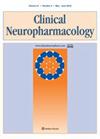利妥昔单抗的真实世界经验:在中低收入地区治疗多发性硬化症的灵丹妙药。
IF 1.5
4区 医学
Q4 CLINICAL NEUROLOGY
引用次数: 0
摘要
背景过去几年,抗 CD20 单克隆抗体在多发性硬化症(MS)的治疗中受到越来越多的关注。目的本研究描述了(i)利妥昔单抗对 MS 患者的疗效和安全性;(ii)评估了利妥昔单抗治疗 MS 后的临床和影像学结果。结果83名(男:女,26:57)多发性硬化症患者在2007年至2022年间接受了利妥昔单抗免疫调节治疗,中位随访时间为18个月。59人(71%)被归类为复发性缓解型多发性硬化症,16人(19%)为继发性进展型多发性硬化症,8人(10%)为原发性进展型多发性硬化症。72例(87%)多发性硬化症患者在接受利妥昔单抗治疗后没有复发。在复发缓解型多发性硬化症患者中,平均年复发率从 1.24 ± 1.19 降至 0.16 ± 0.37。5名患者出现输液相关反应(占不良事件的6%),7名患者出现泌尿系统感染(8.4%),3名患者出现全身感染(3%),1名患者出现卡氏肺孢子菌肺炎(1%),1名患者出现带状疱疹感染(1%)。3例(3.5%)患者出现死亡。结论利妥昔单抗对多发性硬化症患者来说是一种安全、耐受性好、容易获得、价格低廉且有效的治疗选择。中位随访1.5年后,利妥昔单抗在临床和影像学方面均有改善。在接种 COVID 疫苗后,我们的患者均未出现严重的 COVID 感染或副作用。本文章由计算机程序翻译,如有差异,请以英文原文为准。
A Real-World Experience of Rituximab: A Panacea in Therapy of Multiple Sclerosis in Low- and Middle-Income Setting.
BACKGROUND
Anti-CD20 monoclonal antibodies have received increasing attention in the past few years in the treatment of multiple sclerosis (MS).
OBJECTIVES
This study describes the (i) efficacy and safety of rituximab in people living with MS and (ii) assesses clinical and imaging outcomes following rituximab in MS.
METHOD
This is a chart review from the MS registry maintained at the institute from a University Hospital in South India.
RESULT
Eighty-three (M:F, 26:57) people living with MS received rituximab as immunomodulation between 2007 and 2022 with a median follow-up duration of 18 months. Fifty-nine (71%) were classified as relapsing-remitting MS, 16 (19%) were secondary progressive MS, and 8 (10%) were primary progressive MS. Seventy-two (87%) MS patients did not experience any relapse after receiving rituximab. In relapsing-remitting MS patients, the mean annualized recurrence rate dropped from 1.24 ± 1.19 to 0.16 ± 0.37. Infusion-related reaction occurred in 5 (6% of adverse events), urinary infections in 7 (8.4%), systemic infections in 3 (3%), Pneumocystis carinii pneumonia occurred in 1 (1%), and herpes zoster infection in 1 (1%) patient. Mortality was observed in 3 (3.5%) patients. While being on rituximab, 18 (22%) patients had mild COVID-19 illness and they all made complete recovery without any sequalae.
CONCLUSIONS
Rituximab is a safe, well-tolerated, easily accessible, inexpensive, and effective therapeutic option for people with MS. Rituximab showed both clinical and radiological improvement after a median follow-up of 1.5 years. None of our patients showed any severe COVID infection nor side effects after receiving COVID vaccination.
求助全文
通过发布文献求助,成功后即可免费获取论文全文。
去求助
来源期刊

Clinical Neuropharmacology
医学-临床神经学
CiteScore
1.20
自引率
10.00%
发文量
63
审稿时长
6-12 weeks
期刊介绍:
Clinical Neuropharmacology is a peer-reviewed journal devoted to the pharmacology of the nervous system in its broadest sense. Coverage ranges from such basic aspects as mechanisms of action, structure-activity relationships, and drug metabolism and pharmacokinetics, to practical clinical problems such as drug interactions, drug toxicity, and therapy for specific syndromes and symptoms. The journal publishes original articles and brief reports, invited and submitted reviews, and letters to the editor. A regular feature is the Patient Management Series: in-depth case presentations with clinical questions and answers.
 求助内容:
求助内容: 应助结果提醒方式:
应助结果提醒方式:


